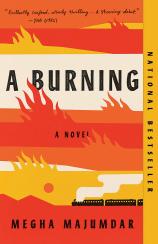A Burning
Review
A Burning
“If the police didn’t help ordinary people like you and me, if the police watched them die, doesn’t that mean that the government is also a terrorist?”
So writes 22-year-old Jivan, a Muslim girl living in a modern-day Kolkata slum, at the beginning of Megha Majumdar’s brilliant, harrowing debut novel. Jivan posts this on Facebook, sparked by outrage at police inaction in the face of a brutal attack, in which a group of men set a train on fire, killing over a hundred people. She posts because she’s genuinely horrified, but also because she experiences a sort of small, defensive rush as she shares her outrage with her Facebook feed in this simple way.
The police descend on her swiftly, accusing her of having planned the attack herself and sedition against the government. Apparently one of her Facebook friends was a terrorist recruiter, and that alone is enough to send her to jail. As she stands trial, two other characters from her life are called to bear witness: PT Sir, Jivan’s gym teacher from school, and Lovely, a lower-class hijra who aspires to be an actress. Jivan had been teaching her English.
"Urgent, heartbreaking, ruthless and true, Majumdar’s debut sears with an expert, unapologetic hand. She writes with a command of each of her three POV characters, the detailed landscape of her world, and the brutal, inevitable conclusion."
Majumdar allows these three voices to intertwine and shift through time. Her expertly rendered details breathe off the page, evoking sights and smells, filth and splendor. Jivan tells the story of her childhood to a journalist, beseeching him to understand where she comes from, asking the public to see her for her innocence. She tells him of her family’s eviction, their disenfranchisement for their Muslim faith, the dangers her mother endures, her father’s beating at the hands of police and his lack of access to adequate health care. She spills her heart to him in vulnerable desperation --- and the journalist gives the world a sensation instead: painting her as a radical, an anarchist, whose hatred of the government turned her violent.
Lovely recounts her history in her acting classes, offering up her own traumas for the sake of being beloved, successful and famous. Her voice is evoked in her ESL English, the language of the colonizer and also a stamp signifying education and class. Lovely is never naive, but she’s hopeful, even as she navigates heartbreak --- and a sacrifice that, perhaps, was never really her right to make.
PT Sir’s story is particularly chilling. A school teacher who only happens upon the rally, he listens --- half-heartedly the first time, more curiously the second. The leader of the party speaks of bettering their nation, bringing more jobs, strengthening the country in ways that the idle government, as it is, could never dream of --- and PT Sir certainly knows that the government is ineffective. So he’s eager for the chance to help the charismatic party leader --- at first in small ways, and then occasionally by bearing false witness. He’s told he’s only incriminating men who are unquestionably guilty, the government lacking adequate evidence. The party leader absolves him of any of his own hesitation. And as PT Sir rises in the ranks, the crimes he’s encouraged to condone open into a yawning, hellish chasm --- and so do the rewards of money and status lavished upon him, so long as he acquiesces. And so he does. He wants to.
In prison, Jivan tirelessly works on her appeal. She’s hopeful and diligent throughout, more so than many other women in the prison. Yet too often, fate isn’t something that can be written ourselves --- especially not for those who are disenfranchised to begin with, like Jivan and Lovely, or those who think they are, like PT Sir. For them, fate is the choices of people in power, scripted by how that power is wielded, and they become pawns or collateral damage.
Urgent, heartbreaking, ruthless and true, Majumdar’s debut sears with an expert, unapologetic hand. She writes with a command of each of her three POV characters, the detailed landscape of her world, and the brutal, inevitable conclusion. A BURNING is unflinching, even when exploring its bloodiest, most vicious realities. It interrogates the role of the press in the obfuscation of the truth, the bloodthirsty nature of media and social media, the terrible choices that marginalized people must make to survive, the ease with which insecure men become radicalized if it makes them feel powerful, and the futility of innocence in a world literally governed by corruption.
Reviewed by Maya Gittelman on June 12, 2020
A Burning
- Publication Date: June 29, 2021
- Genres: Fiction, Literary Fiction, Suspense, Thriller
- Paperback: 304 pages
- Publisher: Vintage
- ISBN-10: 0593081250
- ISBN-13: 9780593081259




